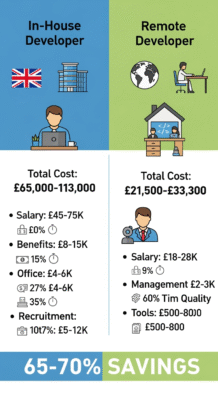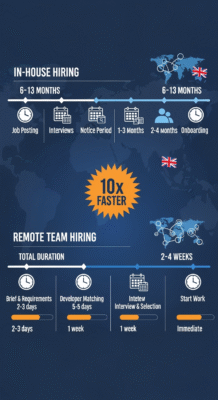Hiring developers in the UK is a strategic decision. Companies often face the choice between in-house developers and remote teams. Each comes with its advantages and challenges.
Cost Breakdown
In-house Developer in the UK
- Average Salary: £45,000 – £70,000/year
- Benefits: £7,000 – £12,000/year (insurance, pension, perks)
- Office & Equipment: £3,000 – £5,000/year
- Recruitment Costs: £3,000 – £7,000 per hire
- Total Annual Cost: £58,000 – £94,000+
Hiring Timeline: ~2–3 months (finding, interviewing, onboarding)
Remote Developer (via TalentsBridge)
- Salary: £18,000 – £30,000/year (location-based)
- Benefits: Included in TalentsBridge fee
- Equipment & Office: Not required (remote setup)
- Recruitment Costs: £0 (handled by TalentsBridge)
- Total Annual Cost: £18,000 – £30,000
Hiring Timeline: 2–3 weeks (pre-vetted candidates ready)

Key Comparisons
| Factor | In-house UK Developer | Remote Developer (TalentsBridge) |
| Cost | £58k – £94k+ | £18k – £30k |
| Hiring Timeline | 2–3 months | 2–3 weeks |
| Flexibility | Low (fixed contracts) | High (scalable teams) |
| Talent Pool | Local only | Global, pre-vetted |
| Overheads | High | Minimal |
When to Choose Which
- Choose In-house if:
- You need constant collaboration in the office
- You have long-term projects with sensitive data
- You want cultural alignment within the local team
- Choose Remote if:
- You want to save up to 70% on hiring costs
- You need to scale quickly
- You’re open to global, diverse talent

Success Story
A London-based fintech startup cut costs by 60% by switching from hiring locally to building a remote team via TalentsBridge. They hired 3 developers within a month and scaled without overhead costs.
Why TalentsBridge?
- Access to pre-vetted developers worldwide
- Save up to 70% on costs
- Fast hiring process (weeks, not months)
- Ongoing support for contracts, compliance, and payroll
🚀 Looking to hire developers in the UK without high costs?
👉 Book a free consultation with TalentsBridge today.
FAQs on How to Hire Developers in the UK: In-house vs Remote Teams
Q1: How do you ensure quality with remote developers?
A: Quality assurance starts with rigorous vetting. Leading remote hiring platforms use multi-stage screening processes including technical assessments, portfolio reviews, and English proficiency tests. Look for providers who only accept 2-5% of applicants, conduct live coding interviews, and provide ongoing performance monitoring. Additionally, establish clear project milestones, use collaboration tools like Slack and Jira, and implement regular code reviews to maintain quality standards.
Q2: What about time zone differences?
A: Time zone management is crucial for successful remote collaboration. The optimal approach is ensuring a minimum 4-6 hours of overlap with your business hours. Eastern European developers work in the same timezone as UK, while Asian developers (India, Philippines, Sri Lanka) typically provide 4-5 hours of overlap. Use asynchronous communication tools, establish core collaboration hours, and leverage the time difference for 24/7 development cycles where night work in your timezone becomes day work for your remote team.
Q3: How do you handle legal compliance when hiring international remote workers?
A: UK companies must navigate several legal requirements when hiring international remote developers. Key compliance areas include IR35 regulations for contractor classification, GDPR for data protection, and employment law differences. The safest approach is working with established outsourcing partners who handle legal compliance, or using contractor agreements that clearly define the working relationship. Consider using Employer of Record (EOR) services for direct employment, and always consult with legal experts familiar with international employment law.
Q4: What if the remote developer doesn’t work out?
A: Mitigate hiring risks through structured onboarding and trial periods. Best practices include starting with a 2-4 week paid trial project, setting clear performance metrics and deliverables, and establishing regular check-in points. Reputable remote hiring platforms offer replacement guarantees (typically 30-90 days) at no additional cost. Always have backup candidates ready and maintain detailed documentation of work quality and communication issues to support any necessary transitions.



